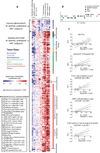Dysbiosis of the gut microbiota is associated with HIV disease progression and tryptophan catabolism
- PMID: 23843452
- PMCID: PMC4094294
- DOI: 10.1126/scitranslmed.3006438
Dysbiosis of the gut microbiota is associated with HIV disease progression and tryptophan catabolism
Erratum in
-
Erratum for the Research Article: "Dysbiosis of the gut microbiota is associated with HIV disease progression and tryptophan catabolism" by I. Vujkovic-Cvijin, R. M. Dunham, S. Iwai, M. C. Maher, R. G. Albright, M. J. Broadhurst, R. D. Hernandez, M. M. Lederman, Y. Huang, M. Somsouk, S. G. Deeks, P. W. Hunt, S. V. Lynch, J. M. McCune.Sci Transl Med. 2017 Nov 8;9(415):eaar3209. doi: 10.1126/scitranslmed.aar3209. Sci Transl Med. 2017. PMID: 29118261 No abstract available.
Abstract
Progressive HIV infection is characterized by dysregulation of the intestinal immune barrier, translocation of immunostimulatory microbial products, and chronic systemic inflammation that is thought to drive progression of disease to AIDS. Elements of this pathologic process persist despite viral suppression during highly active antiretroviral therapy (HAART), and drivers of these phenomena remain poorly understood. Disrupted intestinal immunity can precipitate dysbiosis that induces chronic inflammation in the mucosa and periphery of mice. However, putative microbial drivers of HIV-associated immunopathology versus recovery have not been identified in humans. Using high-resolution bacterial community profiling, we identified a dysbiotic mucosal-adherent community enriched in Proteobacteria and depleted of Bacteroidia members that was associated with markers of mucosal immune disruption, T cell activation, and chronic inflammation in HIV-infected subjects. Furthermore, this dysbiosis was evident among HIV-infected subjects undergoing HAART, and the extent of dysbiosis correlated with activity of the kynurenine pathway of tryptophan catabolism and plasma concentrations of the inflammatory cytokine interleukin-6 (IL-6), two established markers of disease progression. Gut-resident bacteria with capacity to catabolize tryptophan through the kynurenine pathway were found to be enriched in HIV-infected subjects, strongly correlated with kynurenine levels in HIV-infected subjects, and capable of kynurenine production in vitro. These observations demonstrate a link between mucosal-adherent colonic bacteria and immunopathogenesis during progressive HIV infection that is apparent even in the setting of viral suppression during HAART. This link suggests that gut-resident microbial populations may influence intestinal homeostasis during HIV disease.
Figures





References
-
- Giorgi JV, Hultin LE, McKeating JA, Johnson TD, Owens B, Jacobson LP, Shih R, Lewis J, Wiley DJ, Phair JP, Wolinsky SM, Detels R. Shorter Survival in Advanced Human Immunodeficiency Virus Type 1 Infection Is More Closely Associated with T Lymphocyte Activation than with Plasma Virus Burden or Virus Chemokine Coreceptor Usage. Journal of Infectious Diseases. 1999;179:859–870. - PubMed
-
- Sousa AE, Carneiro J, Meier-Schellersheim M, Grossman Z, Victorino RMM. CD4 T cell depletion is linked directly to immune activation in the pathogenesis of HIV-1 and HIV-2 but only indirectly to the viral load. The Journal of Immunology. 2002;169:3400–3406. - PubMed
-
- Deeks SG, Kitchen CM, Liu L, Guo H, Gascon R, Narváez AB, Hunt P, Martin JN, Kahn JO, Levy J, McGrath MS, Hecht FM. Immune activation set point during early HIV infection predicts subsequent CD4+ T-cell changes independent of viral load. Blood. 2004;104:942–947. - PubMed
-
- Estes JD, Gordon SN, Zeng M, Chahroudi AM, Dunham RM, Staprans SI, Reilly CS, Silvestri G, Haase AT. Early resolution of acute immune activation and induction of PD-1 in SIV-infected sooty mangabeys distinguishes nonpathogenic from pathogenic infection in rhesus macaques. The Journal of Immunology. 2008;180:6798–6807. - PMC - PubMed
-
- Estes JD, Harris LD, Klatt NR, Tabb B, Pittaluga S, Paiardini M, Barclay GR, Smedley J, Pung R, Oliveira KM, Hirsch VM, Silvestri G, Douek DC, Miller CJ, Haase AT, Lifson J, Brenchley JM. Damaged intestinal epithelial integrity linked to microbial translocation in pathogenic simian immunodeficiency virus infections. PLoS Pathog. 2010;6:e1001052. - PMC - PubMed
Publication types
MeSH terms
Substances
Associated data
- Actions
Grants and funding
- T32 AI007334/AI/NIAID NIH HHS/United States
- 5T32AI007334-23/AI/NIAID NIH HHS/United States
- P30 AI027763/AI/NIAID NIH HHS/United States
- DPI OD00329/OD/NIH HHS/United States
- R37 AI040312/AI/NIAID NIH HHS/United States
- P30-AI027763/AI/NIAID NIH HHS/United States
- U19 AI96109/AI/NIAID NIH HHS/United States
- K23 CA157929/CA/NCI NIH HHS/United States
- U19 AI096109/AI/NIAID NIH HHS/United States
- F32 AI091534/AI/NIAID NIH HHS/United States
- UL1 RR024131/RR/NCRR NIH HHS/United States
- RR024131/RR/NCRR NIH HHS/United States
- DP1 OD000329/OD/NIH HHS/United States
LinkOut - more resources
Full Text Sources
Other Literature Sources
Medical
Molecular Biology Databases

